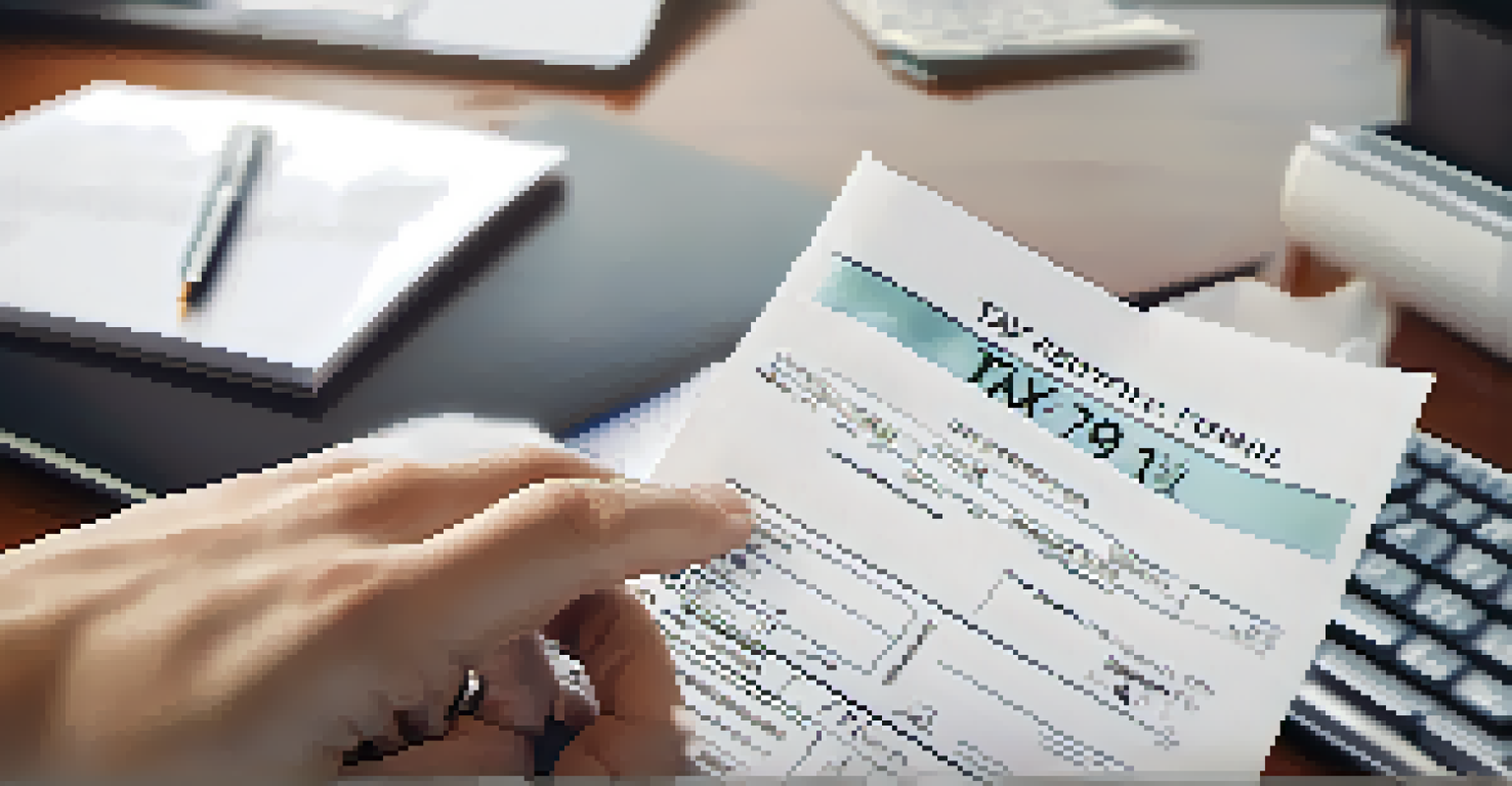Tax Law Changes: A Guide for Freelancers and Gig Workers

Understanding the Latest Tax Law Changes for 2023
As a freelancer or gig worker, staying updated on tax law changes is crucial. The 2023 tax year has brought several adjustments that could impact how you file your taxes. From deductions to tax rates, understanding these changes can help you avoid surprises come tax season.
The hardest thing about being a freelancer is that you have to do everything yourself, including keeping track of your own taxes.
One significant change is the adjustment in standard deduction amounts, which can affect your taxable income. Additionally, various tax credits have been updated, providing potential benefits for freelancers who qualify. It's essential to review these changes to maximize your tax savings.
Moreover, some new reporting requirements have been introduced for gig economy platforms. Being aware of these requirements can help you stay compliant and avoid penalties. Understanding the landscape of tax laws can empower you to make informed financial decisions.
Impact of New Reporting Requirements for Gig Workers
In 2023, the IRS has increased scrutiny on gig economy platforms, resulting in new reporting obligations. Companies like Uber and Airbnb must now report earnings for workers who make over $600, which means freelancers need to keep meticulous records. This change emphasizes the importance of tracking your income accurately.

If you're a gig worker, you may notice that you receive a Form 1099-K instead of a traditional 1099-MISC if you exceed this threshold. This form will detail your earnings, making it easier for the IRS to verify your reported income. Understanding how these forms work can help ensure your tax filing goes smoothly.
Stay Updated on Tax Changes
Freelancers must be aware of new tax law changes in 2023, including adjustments to deductions and reporting requirements.
The new reporting requirements not only enhance compliance but also aim to ensure that all workers pay their fair share of taxes. While this may feel burdensome, it ultimately creates a more equitable tax system. Embracing these changes can help you avoid headaches in the long run.
Deductions: What You Can Still Claim as a Freelancer
Despite the changes in tax law, freelancers still have access to numerous deductions that can significantly reduce taxable income. Common deductions include home office expenses, internet costs, and equipment purchases. Knowing which expenses qualify can help you maximize your deductions.
It's not what you earn, but what you keep that counts.
One deduction that has remained is the Qualified Business Income (QBI) deduction, which allows eligible freelancers to deduct up to 20% of their business income. This can be a substantial benefit, especially for those who earn a decent income from freelance work. The key is to ensure you meet the requirements to claim it.
It's also worth noting that keeping detailed records of your expenses is essential for claiming deductions. Use accounting software or spreadsheets to track your expenses throughout the year. This proactive approach will make tax season much less stressful.
Self-Employment Tax: What You Need to Know
As a freelancer, you’re not just responsible for income tax; you also need to pay self-employment tax. This tax, which covers Social Security and Medicare, can be a significant expense, often catching freelancers off guard. Understanding this obligation is crucial for effective financial planning.
For 2023, the self-employment tax rate remains at 15.3% on net earnings. This includes 12.4% for Social Security and 2.9% for Medicare. Freelancers can deduct half of this tax when calculating their adjusted gross income, which offers some relief.
Maximize Deductions Effectively
Understanding and claiming available deductions, such as home office expenses and the Qualified Business Income deduction, can significantly reduce taxable income.
To avoid surprises, consider making estimated tax payments quarterly. This approach helps you spread the tax burden throughout the year, preventing a hefty tax bill at the end. Staying ahead of your tax obligations can give you peace of mind.
Retirement Savings: Tax Benefits for Freelancers
Freelancers often overlook retirement savings, but there are tax benefits available that can help you save for the future. For instance, a Solo 401(k) or a SEP IRA allows you to contribute significantly more than a traditional IRA. This can be a smart way to reduce your taxable income while building your retirement nest egg.
With a Solo 401(k), you can contribute both as an employee and employer, allowing for higher contribution limits. In 2023, the total contribution limit can be as high as $66,000, depending on your income. This makes it an attractive option for freelancers looking to save aggressively.
Additionally, contributions to these retirement accounts are tax-deductible, which means they can lower your taxable income for the year. By prioritizing retirement savings, you not only secure your future but also take advantage of valuable tax benefits.
Navigating State and Local Tax Changes
In addition to federal tax law changes, freelancers must also navigate state and local tax regulations. Depending on where you live, you may face different rules regarding income tax, sales tax, and even business licenses. Understanding these obligations is essential to avoid penalties and fines.
Some states have adopted new tax laws that could affect freelancers, such as changes in sales tax for digital services or modifications to income tax rates. Staying informed about these local changes can help you plan your finances more effectively.
Plan for Self-Employment Tax
Freelancers should prepare for self-employment tax obligations, which include Social Security and Medicare contributions, to avoid surprises during tax season.
It's advisable to consult a tax professional familiar with your state's laws to ensure compliance. They can provide insights on how to manage your tax liabilities and take advantage of any available credits or deductions.
Best Practices for Preparing Your Taxes as a Freelancer
Proper preparation is key to a smooth tax season for freelancers. Start by gathering all relevant documents, such as 1099 forms, expense receipts, and any other income statements. Organizing these documents early can save you time and stress as the tax deadline approaches.
Consider using accounting software tailored for freelancers to help track income and expenses throughout the year. These tools often provide features that simplify tax preparation, such as automatic categorization of expenses and easy generation of financial reports.

Lastly, don’t hesitate to seek professional help if you feel overwhelmed. A tax professional can help you navigate complex tax laws, ensure compliance, and find deductions you may have overlooked. Investing in expert advice can ultimately save you money and time.